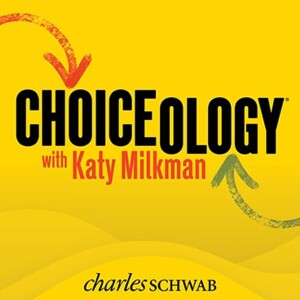
Not Quite Enough: With Guests Howard Scott Warshaw, Sendhil Mullainathan & Anuj Shah
 2019-09-23
2019-09-23
Think back to a situation where you’ve been really pressed for time. Chances are good that the pressure of a deadline or an appointment caused you to be (a) hyper-focused and efficient or (b) panicked and prone to errors.
Now think of a situation where you had plenty of available time. While you were probably much less stressed, it’s also likely that the superpowers of hyper-focus didn’t come so easily.
In this episode of Choiceology with Katy Milkman, we look at how not having enough time or money or other resources affects behavior and decision-making.
We begin the episode with Howard Scott Warshaw. Warshaw was a very successful game developer at Atari during the company’s heyday in the 1980s. He worked on several best-selling titles, including the hit game Yar’s Revenge. However, he is probably best known for creating E.T. the Extra Terrestrial video game. Some consider it the worst commercial video game ever released. The reason E.T. was so unsuccessful as a gaming experience and a commercial product may have more to do with Atari’s development timeline than with Warshaw’s concept or design.
Next, we test our hypothesis about resource scarcity with a simple bean-bag-toss game. Half of our players were given five bags to throw, while the other half were given only one. You may be surprised to find out which players were more accurate, on average, with their tosses.
Katy then jumps into the science of scarcity with Sendhil Mullainathan. Mullainathan explains that while scarcity taxes the mind and can lead to poor decision-making, it can also pay dividends with increased focus.
Sendhil Mullainathan is the Roman Family University Professor of Computation and Behavioral Science at the University of Chicago Booth School of Business. He is also the author of Scarcity: Why Having Too Little Means So Much.
Anuj K. Shah is a colleague and research collaborator with Sendhil Mullainathan. He joins Katy to discuss simple strategies to help offset the mental load of scarcity. He is an associate professor of behavioral science at the University of Chicago Booth School of Business.
Choiceology is an original podcast from Charles Schwab. For more on the series, visit schwab.com/podcast.
If you enjoy the show, please leave a ⭐⭐⭐⭐⭐ rating or review on Apple Podcasts.
Important Disclosures:
All expressions of opinion are subject to change without notice in reaction to shifting market conditions.
The comments, views, and opinions expressed in the presentation are those of the speakers and do not necessarily represent the views of Charles Schwab.
Data contained herein from third-party providers is obtained from what are considered reliable sources. However, its accuracy, completeness or reliability cannot be guaranteed.
(0919-9CPR)
More Episodes
Create your
podcast in
minutes
- Full-featured podcast site
- Unlimited storage and bandwidth
- Comprehensive podcast stats
- Distribute to Apple Podcasts, Spotify, and more
- Make money with your podcast
It is Free
- Privacy Policy
- Cookie Policy
- Terms of Use
- Consent Preferences
- Copyright © 2015-2024 Podbean.com




